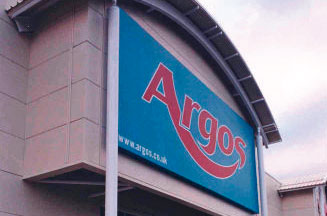
Much like a bride who discovers that her wedding ring came from Elizabeth Duke, observers and investors felt more than a little disappointment when Argos unveiled its sales results at the end of April.
They could be forgiven for thinking that the budget retailer should have emerged as a beneficiary of the recession. Low-cost rival Woolworths had disappeared from the high street at Christmas and discount clothing retailer Primark is doing very well.
However, according to parent company Home Retail Group, consumers have taken the ‘Don't shop for it' line in Argos' advertising a bit too literally. The chain's like-for-like sales were down 4.8%, while benchmark operating profit fell by 19%, or £73m.
With its low-cost, pile-it-high ethos and cheap brands, Argos should have been as secure as the bolted-down seats in its stores, where shoppers sit to wait for their goods. It had even apparently equipped itself for the recession by buying the austere Bush and Alba electronics brands to complement its existing low-end range, Mikomi.
The weak pound has led to rising prices, and there was some bad press when Argos was embroiled in the case of the ‘toxic sofas' - furniture imported from China that caused skin burns to people sitting on it- but surely Argos can do better than this?
We asked Peter Lidgey, managing director of retail specialist Ogilvy Action, and Lisa Thomas, chief executive of LIDA, which holds the Boots CRM account, for their views.
Peter Lidgey managing director, OgilvyAction
Has Argos lost its mojo? Its bricks-and-mortar business, like most high-street retailers, is suffering, and it's the big-ticket items that are most affected.
However, shoppers have not stopped spending altogether. As they spend more time at home, small upgrades make a big difference, so home entertainment is high on the shopping list.
Argos needs to master the complex shopper path to purchase in both the virtual and physical worlds if it is to guarantee its future success. Driving traffic and encouraging shoppers to return is no easy task in today's market.
The Argos value proposition is both its strength and its weakness. Today, shoppers want value for money, not just low prices. Service, ease of navigation, personalisation, convenience and post-purchase satisfaction are all critical in guaranteeing happy customers who keep coming back.
Argos is never going to be an M&S or Habitat, nor should it aspire to be. It will weather this storm better than most and will be around for many years.
Remedy
- Argos offers value, but so do other retailers: it needs to be famous for something it alone can own.
- Encourage impulse spend.
- Drive complementary purchases as part of the shopper journey, especially in the shop. If someone orders a tent, they can probably be persuaded to buy a sleeping bag, gas stove etc.
- Encourage people postponing big-ticket items to create wishlists like they can on Amazon. Argos can then target consumers at the right time.
- Create a regular reason to visit the website, such as web-exclusive offers.
- Address the emotional aspect of the shopping experience.
Lisa Thomas chief executive, LIDA
What Bill Bailey once called the Argos ‘laminated book of dreams', designed to ‘catch the tears of joy', has lost its sheen. The corners are looking tatty.
This retailer is the latest victim of the high-street spending slump - sales are down by almost 5% and the weakness of the pound has led to a rising cost of goods. Result: a hefty 19% dip in profits.
Is Argos' famed low cost enough to keep consumers poring over its catalogues? Times have changed and consumers now also demand great service, variety, convenience and quality from retailers. Meanwhile, competitors - notably, Tesco Direct - are closing in.
There is a glimmer of hope: a surprise bounce in April's retail sales. Argos should be well-placed to capitalise on the downturn - as certain MPs reminded us during the recent expenses debâcle. Funnily enough, Argos goods escaped ‘floating duck-house' syndrome, as politicians were able to justify them as essentials, rather than indulgences.
‘If it all goes horribly wrong, we've always got Argos,' Bailey told us. This will remain true only if it acts.
Remedy
- Maintain awareness of Argos' traditional offering - the widest range of value products.
- Further close the gap between clicks and bricks using Check & Reserve - build on the vast online potential.
- Maximise customers' value, harnessing database potential through cross-selling and targeting selected offers.
- Where possible, profile the product range in store: let customers experience the goods.
- Keep innovating and offering customers what they want through channels they want to use.

